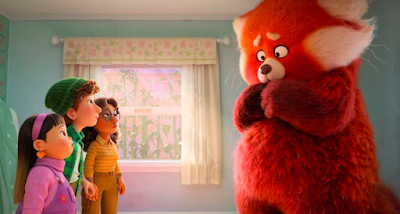Pixar’s Turning Red is a fast-paced, heartfelt, adorable computer-animated cartoon about the emotional intensity of eighth graders. It does so with one of the bubbliest lead characters in recent memory—13-year-old Meilin. She’s a relentlessly chipper, totally type-A student with all the goofy jokes, funny friends, pop culture addictions, and passionate crushes of many girls her age. The movie—all rounded edges and cartoony colors—brightly and bouncily opens with her interior monologue, teeming with loose and silly and exuberantly positive self-talk. She’s confidently herself, navigating her classes and friends and family obligations with ease. That is, until adolescence really starts to sink in, and with it its attendant embarrassments of self—bodily and socially. One associates that time with fleeting passions, roiling interior lives, and explosively convulsive stretches of upset and excitement. It’s only natural. And so here’s a movie about what it means to grow up into a state of crippling self-awareness and have to readjust to find one’s sense of self again. In her case, though, this isn’t just about embarrassment. The blushing implied by the title does double duty, for when she’s overwhelmed and overstimulated, she turns into a big red panda.
This unexpected side-effect of puberty is a family curse. The first time it happens, her mother patiently explains how this happens to every woman in their family, and there’s a ritual they can do once a lunar cycle to suppress it. (There’s the ticking clock Pixar loves so much.) This makes the movie overtly a metaphor for the onset of menstruation—and adolescent urges of all kinds, what with this 2002-set middle-school friend group innocently lusting after a boy band (crooning catchy new period-appropriate music by Billie Eilish and bro). Writer-director Domee Shi, whose short Bao’s motherly affection for a personified dumpling is a similarly fantastical approach to raw familial feelings, and her co-writers approach these facts of teen girl life with frank symbolism, breezily and naturally. There’s none of the tortured hand-wringing one might associate with more timid filmmakers of any sort, let alone the Hollywood animated family picture. As the movie quickly and agreeably develops its fantasy conceit, Meilin learns that being a grown-up doesn’t mean independence, or cheap rebellion from family traditions, or even any pat be-yourself rebellion. Instead, Shi draws out a lesson of complicated self-knowledge and personal growth, that to be yourself draws upon your influences from family, friends, and cultures past and present. Now that’s getting older. And maybe a little wiser.
So it has a slightly more mature premise than the usual kids’ picture, and is so warmly welcoming to its young teen mindset that it carries off lightly what other Pixar efforts wear more tearfully. That’s not to say it’s any less earnest, or doesn’t earn its climactic sentimental moments. But it’s so cheerfully of its time and place, animated with such personality and so particular to the giddy extremes of its character’s age, that it’s a total charmer. This fantastical comedy takes its main character’s mindset seriously—who among us, after all, didn’t sometimes view the changes of teen years as something unusual, or even monstrous—and yet is told with just enough sense of perspective for a wry adult distance to be amused at the young teen’s lack of it. That’s what also makes the movie enchantingly real in its portrayal of mother/daughter relationships, finding a generational intermingling of matrilineal tension and compassion that feels true in the midst of the fanciful scampering. It is, per Pixar’s latest run of originals’ thematic preoccupations, a story about the gulfs of misunderstanding that even good intentions can open up between parents and children, and the bittersweet magic it takes to repair that bond. No surprise that it’s also about a journey of self-discovery, the new friendships one makes along the way, and the old friendships that can sustain one throughout. It’s there in Luca, Soul, Onward, Coco, The Good Dinosaur, Inside Out, Brave. But none of those, great as some can be, are this poppy and funny and glittery, or build to a lovely moment where ancient family magic and the tunes of a dreamy boy band harmonize—and point the way to a fuller expression of self.


No comments:
Post a Comment